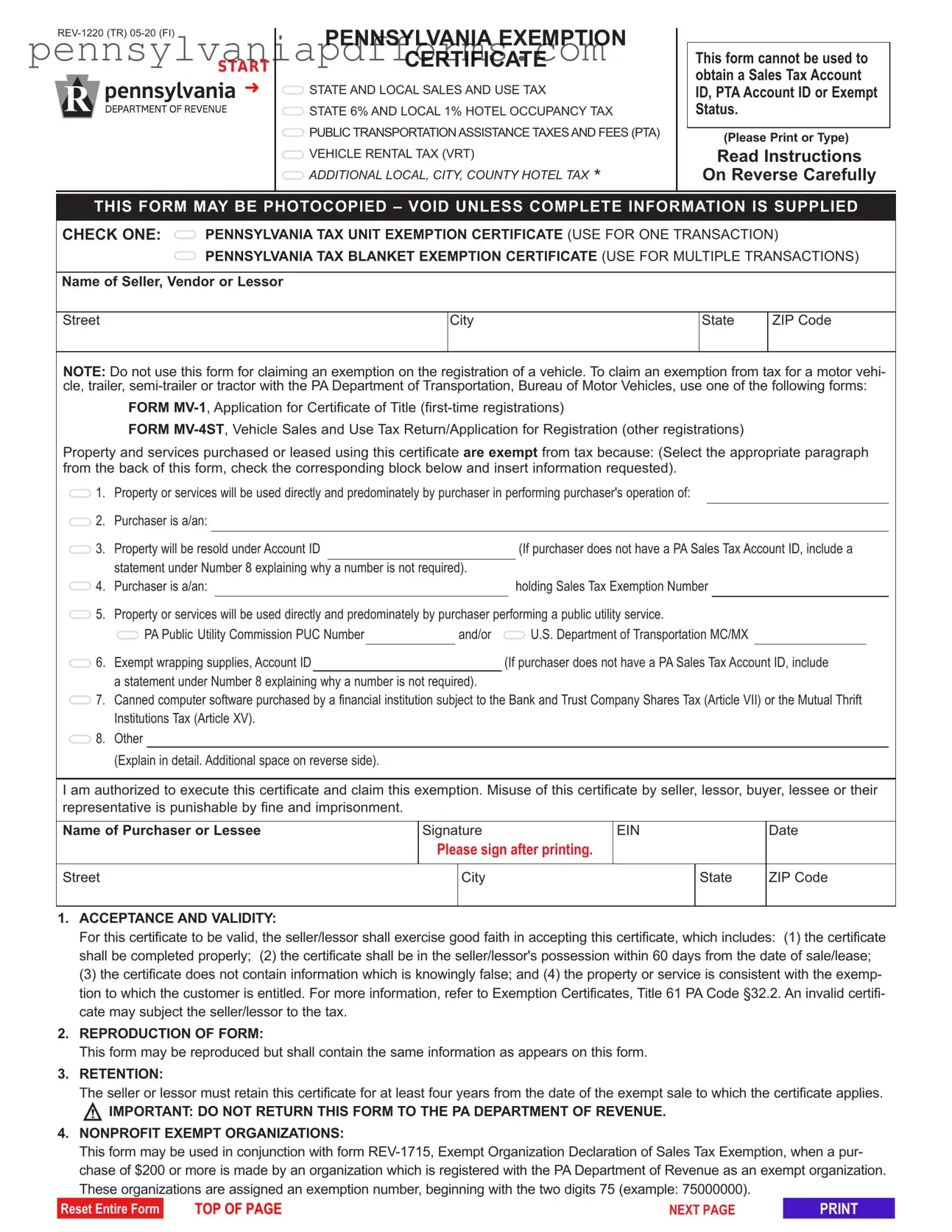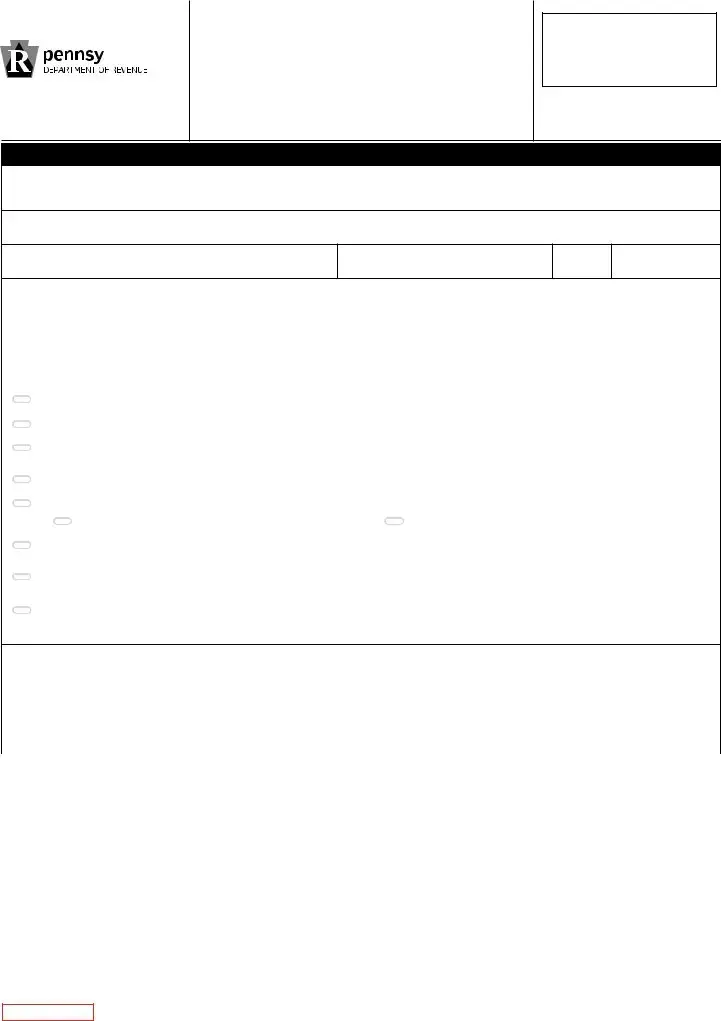GENERAL INSTRUCTIONS
Those purchasers set forth below may use this form in connection with the claim for exemption for the following taxes:
a.State and local sales and use tax;
b.PTA rental fee or tax on leases of motor vehicles;
c.Hotel occupancy tax (state 6%, Philadelphia 1%, Allegheny 1%) if referenced with the symbol (●);
d.PTA fee on the purchase of tires if referenced with the symbol (+);
e.Vehicle rental tax (VRT).
EXEMPTION REASONS
1.) Property and/or services will be used directly and predominately by purchaser in performing purchaser's operation of:
A. Manufacturing |
B. Mining |
C. Dairying |
D. Processing |
E. Farming |
F. Shipbuilding |
G. Timbering |
This exemption is not valid for property or services used in: (a) constructing, repairing or remodeling of real property, other than real property used directly in exempt operations; or (b) maintenance, managerial, administrative, supervisory, sales, delivery, warehousing or other nonoperational activities. This exemp- tion is not valid for vehicles that are required to be registered under the Vehicle Code, as well as supplies and repair parts for such vehicles, the PTA tire fee, and certain taxable services.
2.) Purchaser is a/an:
+A. Instrumentality of the commonwealth (to include public schools and state universities).
+B. Political subdivision of the commonwealth (includes townships and boroughs).
+l C. Municipal authority created under the Municipality Authorities Acts.
+l D. Electric cooperative corporations created under the Electric Cooperative Law of 1990.
l E. Cooperative agricultural associations required to pay corporate net income tax under the Cooperative Agricultural Association Corporate Net Income Tax Act (exemption not valid for registered vehicles).
+l F. Credit unions organized under Federal Credit Union Act or Commonwealth Credit Union Act.
+l G. U.S. government, its agencies and instrumentalities.
l H. Federal employee on official business (exemption limited to hotel occupancy tax only. A copy of orders or statement from supervisor must be attached to this certificate).
I.School bus operator (This exemption certificate is limited to the purchase of parts, repairs or maintenance services upon vehicles licensed as school buses by the PA Department of Transportation).
J.Charter Schools and Community Colleges.
3.) Property and/or services will be resold or rented in the ordinary course of purchaser's business. If purchaser does not have a PA Sales Tax Account ID (8 digit number assigned by the department), complete Number 8 explaining why such number is not required. This exemption is valid for property or services to be resold: (1) in original form; or (2) as an ingredient or component of other property.
4.) Renewable Entities beginning |
Permanent Exemptions beginning with |
Special Exemptions: |
with “75”: |
the two numbers “75”: |
A. Religious Organization |
D. Volunteer Fire Company |
F. Direct Pay Permit Holder |
B. Nonprofit Educational Institution |
E. Relief Association |
G, Individual Holding Diplomatic ID |
C. Charitable Organization |
|
H. Keystone Opportunity Zone |
|
|
(beginning with two digit 72 account number) |
|
|
I. Tourist Promotion Agency |
Exemptions for exempt organizations are limited to purchases of tangible personal property or services for use and not for sale. Exempt organizations A-E above, shall have an sales tax exemption certificate number assigned by the PA Department of Revenue. Exempt organizations A-E above, are not exempt for purchases used for the following: (1) constructions, improvement, repair or maintenance or any real property, except supplies and materials used for routine repair or main- tenance of the real property; (2) any unrelated activities or operation of a public trade or business; or (3) equipment used to maintain real property.
5.) Property or services will be used directly and predominately by purchaser in the production, delivery or rendition of public utility services as defined by the PA Utility Code.
This exemption is not valid for property or services used for the following: (1) construction, improvement, repair or maintenance of real property, other than real property used directly in rendering the public utility services; or (2) managerial, administrative, supervisor, sales or other nonoperational activities; or (3) vehi- cles, as well as supplies and repair parts for such vehicles, unless the predominant use is for providing a common carrier service; or (4) tools and equipment used but not installed in maintenance of facilities or direct use equipment. Tools and equipment used to repair "direct use" property are exempt from tax.
6.) Vendor/seller purchasing wrapping supplies and nonreturnable containers used to wrap property which is sold to others.
7.) Canned computer software or services to canned computer software directly utilized in conducting the business of banking purchased by a financial institution subject to the Bank and Trust Company Shares Tax (Article VII) or the Mutual Thrift Institutions Tax (Article XV).
8.) Other (Attach a separate sheet of paper if more space is required).
*Employees or representatives of the Commonwealth traveling on Commonwealth duty are exempt from any taxes on hotel stays or room rentals imposed by local governments that are in addition to the 6% state tax and the 1% Philadelphia and Allegheny County hotel occupancy tax.







 ➜
➜ STATE AND LOCAL SALES AND USE TAX
STATE AND LOCAL SALES AND USE TAX STATE 6% AND LOCAL 1% HOTEL OCCUPANCY TAX
STATE 6% AND LOCAL 1% HOTEL OCCUPANCY TAX PUBLIC TRANSPORTATION ASSISTANCE TAXES AND FEES (PTA)
PUBLIC TRANSPORTATION ASSISTANCE TAXES AND FEES (PTA) VEHICLE RENTAL TAX (VRT)
VEHICLE RENTAL TAX (VRT) ADDITIONAL LOCAL, CITY, COUNTY HOTEL TAX
ADDITIONAL LOCAL, CITY, COUNTY HOTEL TAX  PENNSYLVANIA TAX UNIT EXEMPTION CERTIFICATE
PENNSYLVANIA TAX UNIT EXEMPTION CERTIFICATE  PENNSYLVANIA TAX BLANKET EXEMPTION CERTIFICATE
PENNSYLVANIA TAX BLANKET EXEMPTION CERTIFICATE  IMPORTANT: DO NOT RETURN THIS FORM TO THE PA DEPARTMENT OF REVENUE.
IMPORTANT: DO NOT RETURN THIS FORM TO THE PA DEPARTMENT OF REVENUE.